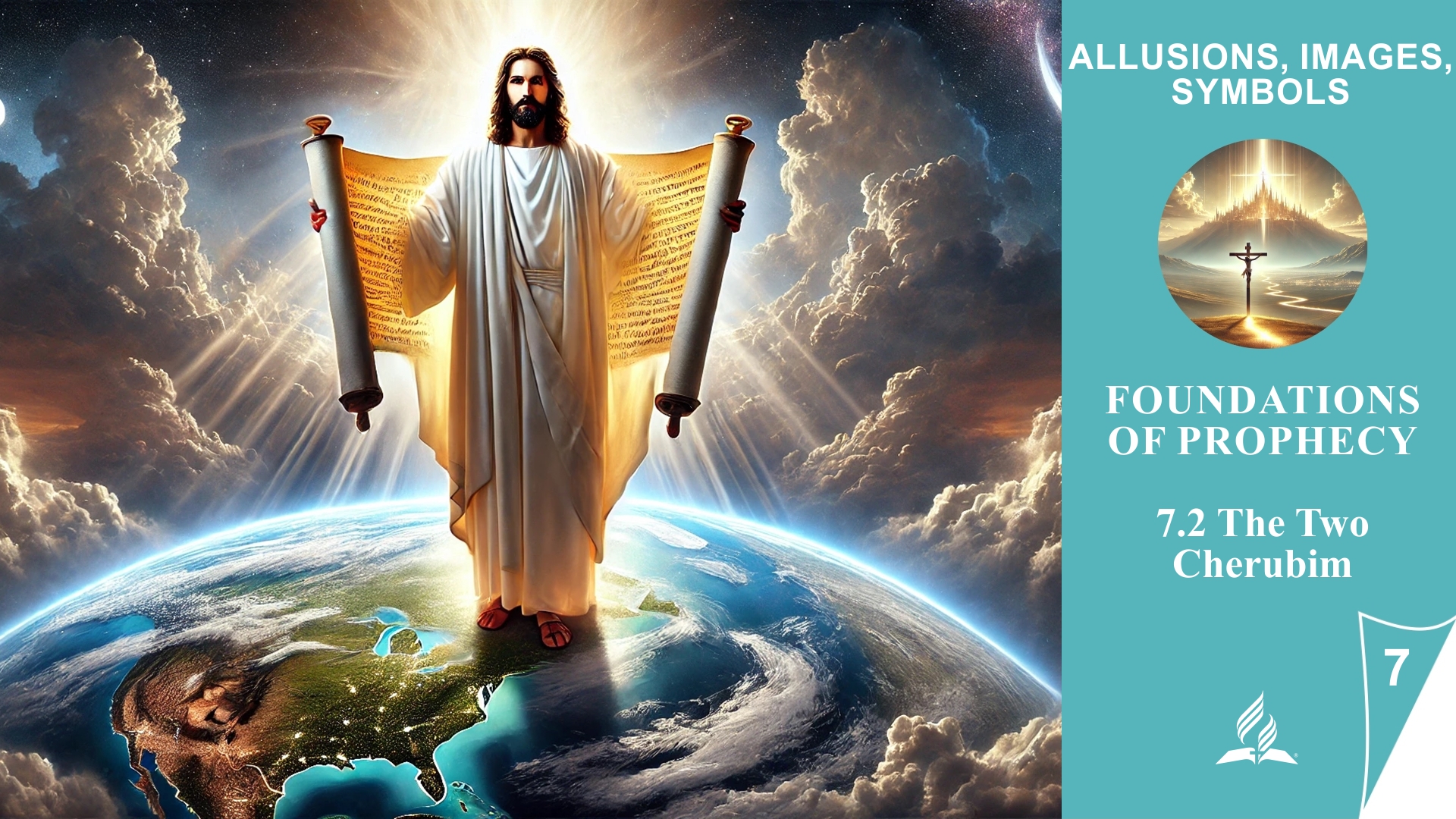Lesson 7.Foundations of Prophecy | 7.2 The Two Cherubim | ALLUSIONS, IMAGES, SYMBOLS | LIVING FAITH



📘 Lesson 7: Foundations of Prophecy
7.2 The Two Cherubim
The Cherubim at Eden’s Gate—Guardians of Life, Signs of Hope
…………………………………………………………………
🟦 Introduction
After the Fall, Adam and Eve were driven out of the Garden of Eden. Yet God did not leave them without hope. At the eastern entrance to the garden He stationed two cherubim, wielding a flaming sword to guard the way to the Tree of Life (Genesis 3:24). These cherubim were not merely sentinels but also symbols of God’s ongoing presence and of the promise of redemption.
………………………………………………………………….
📖 Bible Study
📌 Question: What was the role of the cherubim—and why?
In Genesis 3:24 we read that God placed the cherubim east of Eden to guard the path to the Tree of Life. This prevented fallen humanity from gaining eternal life in its sinful state. Yet the cherubim were more than gatekeepers; they symbolized God’s presence and the hope of future restoration. Their presence reminded mankind that access to God was blocked but not lost forever. Later, the cherubim were depicted in the Tabernacle and the Temple, overshadowing the Ark of the Covenant—the place where God met His people (Exodus 25:18–22).
………………………………………………………………….
✨ Spiritual Principles
-
God’s Holiness and Justice: The cherubim guard access to the Tree of Life, underscoring God’s holiness and the consequences of sin.
-
God’s Presence: Their placement symbolizes God’s continuing desire to dwell with His people.
-
Hope of Redemption: Even amid separation, God offers hope through the promised Messiah.
………………………………………………………………….
🧩 Application for Daily Life
The story of the cherubim teaches us that even in seasons of separation and loss, God’s presence and hope remain. In our daily lives, we can remember that despite our failures, God is with us and points us toward redemption. Like the cherubim at Eden’s gate, we too can serve as beacons of hope and guides to God’s presence for others.
………………………………………………………………….
✅ Conclusion
The cherubim at Eden’s gate are more than guards; they symbolize God’s holiness, His abiding presence, and the hope of redemption. They remind us that despite sin’s barrier, God has prepared a way back to Himself.
………………………………………………………………….
💭 Thought of the Day
Though the path to the Tree of Life was blocked, hope of redemption remained alive—guarded by cherubim who symbolize God’s presence and promise.
………………………………………………………………….
🎨 Illustration – The Guardians of the Lost Garden
In the quiet of night, as the city slept beneath darkness, Samuel sat alone in his study. The dim glow of his desk lamp cast flickering shadows while rain tapped softly on the window. A scholar of ancient cultures, he had recently been gripped by a restless longing for something beyond the tangible.
His research led him to the cherubim—those mysterious beings described in ancient texts as the guardians of Eden. They were not only protectors but symbols of hope, promising that humanity would one day return to paradise. The idea fascinated him.
One evening, as he read an old manuscript, he paused at a passage: “He drove the man out, and placed cherubim east of the garden of Eden, with a flaming sword that turned every way, to guard the way to the tree of life.” The words seared into his mind.
In the weeks that followed, Samuel studied the cherubim’s symbolism. He realized they were more than sentinels; they bore witness to God’s presence. In the Tabernacle, their wings stretched over the Mercy Seat atop the Ark of the Covenant—the place where God met His people. They signified that God dwelt among them.
This discovery moved Samuel deeply. He began to see that the cherubim were not distant, mystical creatures but emblems of God’s nearness—His willingness to be with humanity despite its failures.
One night he dreamed he stood before a glorious garden, its entrance flanked by two radiant cherubim. A brilliant light shone between them. As he approached, he felt overwhelming warmth and love emanating from that light, and a voice said, “The way is not closed but prepared. Return, and you will enter the garden once more.”
When he awoke, Samuel was changed. He felt a profound calling—not only as a historian but as a witness to God’s presence. He began giving lectures, sharing his insights, and encouraging people to seek God’s nearness in their own lives.
For Samuel, the cherubim became living symbols of hope—the promise that the way back to God is always open. And so the historian became a messenger of divine presence, reminding others that God dwells among them, ready to welcome them with open arms.




















